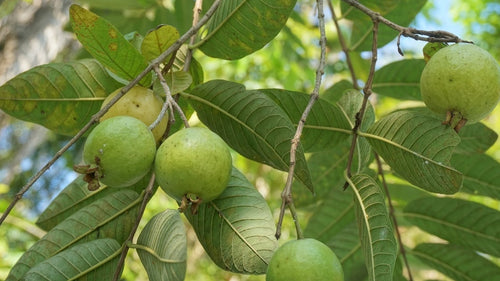Soudal India Goes Green: Agroforestry on World Environment Day
On the occasion of World Environment Day 2025, Soudal India, in collaboration with Grow Billion Trees, proudly launched the Soudal Forest, a lasting c Read more
Project Update 3
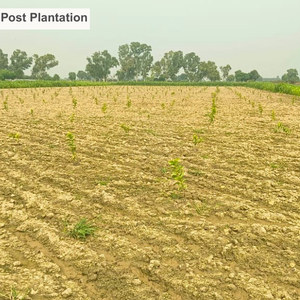
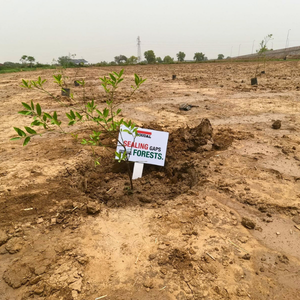
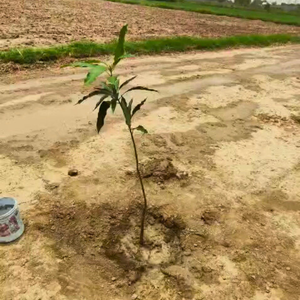
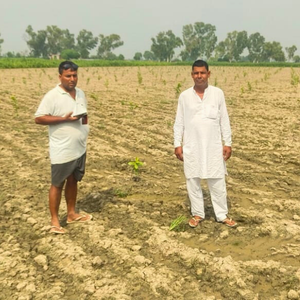
Project Update 2
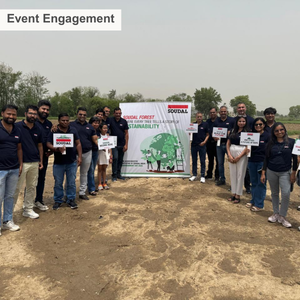
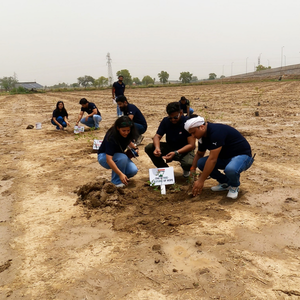
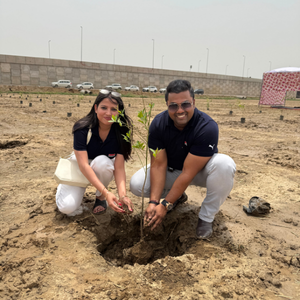
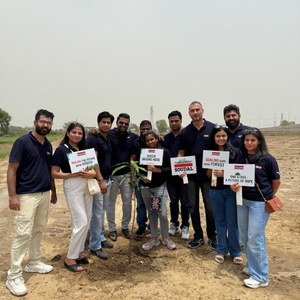
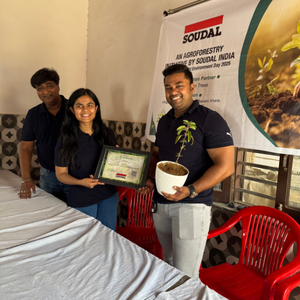
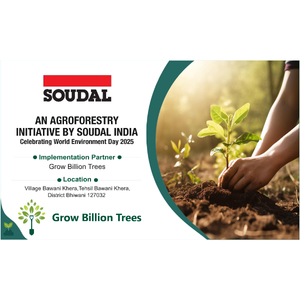
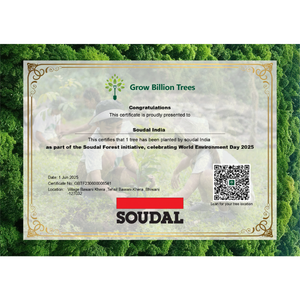
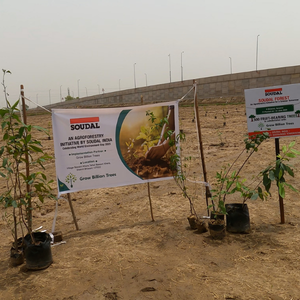
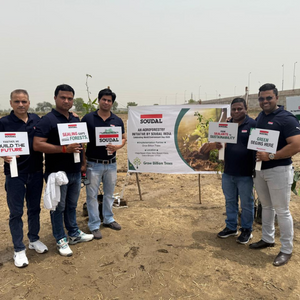
Project Update 1
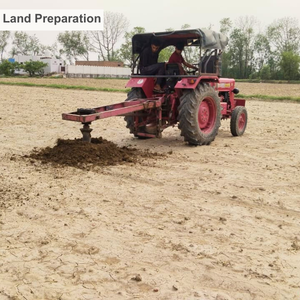
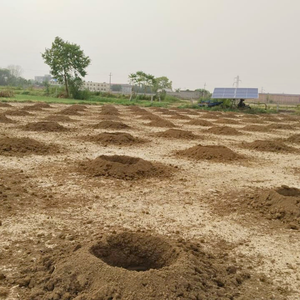
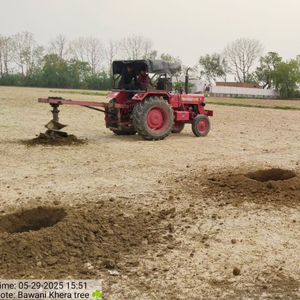
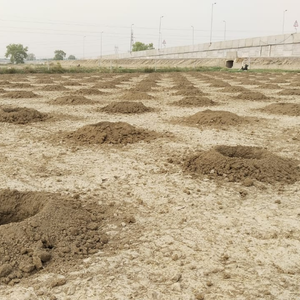
Digital Forest
Forest with 500 Trees planned
Want to plant your tree now?
Plant a Tree @ 299Trees Planted
Soudal India Goes Green: Agroforestry on World Environment Day
On the occasion of World Environment Day 2025, Soudal India, in collaboration with Grow Billion Trees, proudly launched the Soudal Forest, a lasting commitment to environmental regeneration and a vision for a truly sustainable future.
Rooted in the agroforestry model, this initiative saw the plantation of 500 native fruit-bearing trees in Bhiwani, Haryana. By integrating trees with agriculture, this approach restores degraded land, enriches biodiversity, and strengthens the livelihoods of local farming communities.
But this is not just a plantation drive
It’s a movement. A mission. A message.
A living symbol of Soudal’s belief that sustainability starts with responsibility and grows through action.
Each tree planted in the Soudal Forest contributes to:
🌿 Carbon Sequestration
💧 Enhanced Soil and Water Health
👩🌾 Farmer Empowerment and Livelihood Support
🌾 Food Security and Ecological Balance
🌍 A Healthier, Greener Planet
Together, these trees are building a resilient ecosystem, one that sustains not only the environment but also the lives connected to it.
Project Planning & Execution
No of Trees: 500 Trees
Plantation Location: Village Bawani Khera, Tehsil Bawani Khera, District Bhiwani 127032
Plantation Date: 1st June 2025
Name of Species: Guava
Species Selection & Its Benefits
Soudal India’s Environment Day 2025 agroforestry initiative prioritises the planting of native tree species, ensuring high survival rates and fostering long-term ecological stability. By aligning species choice with local market demand, the project supports environmental sustainability while creating viable income opportunities for farmers. Farmer participation in the selection process ensures smooth integration with existing agricultural practices.
Guava (Psidium guajava) is a climate-resilient, nutrient-rich fruit tree ideal for tropical and subtropical regions. It offers farmers stable income through fresh fruit sales and value-added products like juices and jams, while boosting household nutrition with high vitamin C content. Guava improves soil health, prevents erosion, and attracts pollinators, enhancing biodiversity. Low-maintenance and adaptable to various soils, it begins yielding within two to four years and can withstand dry conditions once established, making it a sustainable choice for agroforestry that benefits both the environment and farmer livelihoods.
Planting Methodology and Its Advantages
Agroforestry: To celebrate its heartfelt commitment to environmental sustainability, Soudal India organized a tree plantation initiative embracing the principles of agroforestry a sustainable land-use approach that thoughtfully integrates trees into agricultural landscapes. By planting a diverse mix of fruit-bearing and timber trees, this green endeavor nurtures soil health, enhances biodiversity, and strengthens farmers’ livelihoods through improved long-term productivity and income. Rooted in the company’s vision to give back to nature on the occasion of World Environment Day, this initiative reflects Soudal India’s deep respect for ecological balance and its responsibility toward future generations. It stands as a living symbol of Soudal’s commitment to growing not only innovative solutions but also a greener, more resilient planet.
Advantages of Agroforestry
-
Increased Farmer Incomes: This approach helps increase farmers' income by as much as 3 times. Farmers benefit from diversified income sources, lifting economic resilience.
-
Sustainable Livelihoods: Farmers benefit from diversified income sources through the sale of fruits and other tree-based products, reducing dependence on a single crop.
-
Enhanced Biodiversity: Agroforestry creates a diverse ecosystem by integrating trees with crops, attracting pollinators, birds, and beneficial insects that support natural pest control.
-
Environmental Sustainability: This model reduces carbon emissions and promotes sustainable land management, aligning with SDG 13 (Climate Action) and SDG 15 (Life on Land).
-
Food Security & Nutritional Benefits: Fruit-bearing trees provide a direct source of food, improving local nutrition while supporting long-term agricultural productivity.
-
Carbon Sequestration & Climate Resilience: Trees absorb carbon dioxide, helping mitigate climate change while providing shade and windbreaks that reduce temperature extremes and improve microclimatic conditions.
- Soil Health and Water Conservation: Tree roots prevent soil erosion, enhance water retention, and improve soil fertility by fixing nitrogen and adding organic matter. Agroforestry systems also support groundwater recharge, reduce runoff, and improve soil moisture retention, making them ideal for drought-prone regions.
Activities During Tree Plantation
As part of its commitment to environmental sustainability and community well-being, Soudal India organised a tree plantation initiative under the agroforestry concept on the occasion of World Environment Day. The initiative aligned with the company’s goals to restore ecosystems, enhance biodiversity, and strengthen rural livelihoods. Plantation activities were carefully planned, including soil preparation, designated planting areas, and the selection of guava saplings that provide both ecological benefits and sustainable income opportunities for farmers.
On plantation day, the Soudal India team members came together to actively participate in planting activities, highlighting the significance of agroforestry in improving soil health, conserving water, and creating long-term community benefits. The event fostered a spirit of collaboration, environmental awareness, and shared responsibility for nurturing the planted trees.
This initiative marks a meaningful step towards soil enrichment, water retention, and biodiversity enhancement, while also empowering farmers with an additional source of livelihood. Through such actions, Soudal India continues to contribute to a greener, healthier future for both people and the planet.
Conclusion Elements
Impact
Indirect Impact
Community Impact
-
Empowerment of Farmers - By providing training and resources for sustainable farming practices, agroforestry equips farmers with skills to enhance productivity and adapt to environmental changes.
-
Food Security – By integrating fruit-bearing trees into agricultural systems, the initiative ensures a stable food supply, providing nutritious produce for both consumption and market sale.
-
Environmental Awareness – The project educates the local community on the importance of tree planting, biodiversity conservation, and sustainable land use.
-
Enhanced Social Equity – Agroforestry initiatives foster enhanced social equity by empowering marginalized farmers with sustainable livelihoods, bridging economic gaps, and promoting inclusive community participation in environmental conservation efforts.
-
Resilience to Climate Change – Agroforestry improves soil health, enhances water retention, and reduces land degradation, making farming communities more adaptable to changing climate conditions.
-
Health and Well-being – Increased green cover improves air quality, reduces heat stress, and provides access to nutrient-rich fruits, contributing to the overall health of local communities.
Environmental Impact
-
Carbon Sequestration: Trees act as carbon sinks, absorbing significant amounts of CO2 from the atmosphere, helping to mitigate climate change and reduce greenhouse gas emissions.
-
Soil Health Improvement: Agroforestry enriches soil through organic matter from fallen leaves and roots, improving fertility, structure, and nutrient availability for crops.
-
Erosion Prevention: Tree roots stabilize the soil, reducing erosion caused by wind and water while protecting nearby agricultural fields and water bodies.
-
Biodiversity Conservation: By creating habitats for various species, agroforestry enhances biodiversity, supporting pollinators, beneficial insects, and native wildlife.
-
Water Cycle Regulation: Trees improve water retention, recharge groundwater levels, and reduce surface runoff, contributing to a more balanced and sustainable water cycle.
-
Microclimate Regulation: Agroforestry moderates temperature extremes, reduces wind speeds, and increases humidity, creating favorable conditions for crop growth and ecosystem balance.
Achievements
SDG Goals Achieved through Agroforestry
-
SDG 1: No Poverty – By integrating agroforestry with traditional farming, Saudal India's initiative provides farmers with additional income sources through fruit yields, improving economic resilience, and reducing poverty in rural areas.
-
SDG 2: Zero Hunger – The plantation of fruit-bearing trees enhances food security by offering nutritional produce while improving soil health for sustainable agricultural productivity.
-
SDG 3: Good Health and Well-Being – Tree plantations improve air quality, soil fertility, and water conservation, creating a healthier environment for local communities. The presence of green spaces also promotes mental well-being.
-
SDG 4: Quality Education – Saudal India's agroforestry initiative includes farmer training on sustainable land-use practices. These educational efforts equip farmers with knowledge on conservation, resource management, and climate-resilient agriculture.
-
SDG 6: Clean Water and Sanitation – By reducing soil erosion, improving groundwater recharge, and minimising surface runoff, the plantation promotes sustainable water management in the region.
-
SDG 8: Decent Work and Economic Growth – The initiative generates employment opportunities for rural communities, provides training in sustainable agroforestry, and supports long-term economic growth through enhanced land productivity.
-
SDG 9: Industry, Innovation, and Infrastructure – Saudal India's project integrates innovative agroforestry techniques, including multi-layer cropping systems and soil conservation methods, fostering sustainable land use and industry-community collaboration.
-
SDG 10: Reduced Inequalities – By involving small-scale and marginalized farmers, the project promotes economic inclusivity and reduces inequalities by ensuring equitable access to agroforestry benefits.
-
SDG 12: Responsible Consumption and Production – Agroforestry reduces dependency on chemical inputs, promotes organic farming, and ensures the responsible use of natural resources, supporting sustainable agricultural practices.
-
SDG 13: Climate Action – The trees planted by Saudal India act as carbon sinks, sequestering atmospheric carbon dioxide, enhancing ecosystem resilience, and mitigating the effects of climate change in the region.
-
SDG 15: Life on Land – The Saudal India's initiative promotes biodiversity conservation, prevents deforestation, and restores degraded land, fostering healthy ecosystems and sustainable forestry practices.
-
SDG 17: Partnerships for the Goals – The collaboration between Saudal India, Grow Billion Trees, and local farmers demonstrates the power of partnerships in achieving sustainability goals and fostering large-scale ecological restoration.
ESG Achieved through Agroforestry:
-
Environmental Impact: Saudal India's agroforestry initiative plays a crucial role in environmental sustainability by enhancing carbon sequestration, restoring biodiversity, and improving soil and water conservation. The plantation of native and fruit-bearing trees supports climate change mitigation by reducing greenhouse gas emissions and increasing ecosystem resilience. Additionally, the project helps prevent soil erosion, improves groundwater retention, and contributes to a healthier, greener landscape. By integrating sustainable agroforestry practices, this initiative ensures long-term ecological benefits, fostering a self-sustaining environment that supports both nature and local communities.
-
Social Impact: The initiative brings significant social benefits by fostering sustainable livelihoods, improving food security, and enhancing community well-being. By integrating fruit-bearing trees, the project helps farmers diversify their income sources, ensuring greater economic stability and resilience for rural households. Agroforestry practices optimize land use efficiency, leading to higher agricultural productivity while maintaining ecological balance. The plantation also contributes to better air quality, creates green spaces for community well-being, and encourages local participation through awareness programmes. By engaging and educating stakeholders, the initiative empowers communities with the knowledge and skills to adopt sustainable land management practices, fostering long-term environmental and social sustainability.
-
Governance Impact: Saudal India upholds strong governance principles by committing to ethical and responsible corporate practices in sustainability. The agroforestry initiative aligns with Soudal India’s vision of celebrating World Environment Day with purpose and impact by creating a living, breathing gift for Mother Earth, ensuring transparency, accountability, and long-term impact. By collaborating with Grow Billion Trees, farmers and local communities, Soudal India fosters strategic partnerships that promote environmental stewardship and responsible land management. This initiative reflects Soudal India’s deep-rooted dedication to integrating ESG (Environmental, Social, and Governance) principles into their personal and broader value framework. It showcases a powerful example of leadership in sustainability and social responsibility, where environmental action is guided by spiritual intention and a profound sense of purpose.
Building Communities
Soudal India’s agroforestry initiative goes beyond tree plantation; it strengthens rural communities by empowering farmers, fostering collaborations, and creating sustainable livelihoods. By integrating environmental stewardship with social impact, the project nurtures a sense of shared responsibility, driving long-term benefits for both people and the planet.
-
Empowering Farmers: Soudal India’s agroforestry initiative strengthens farmers’ economic stability by diversifying income sources and improving agricultural productivity. By integrating tree plantations with existing farmland, farmers benefit from enhanced soil fertility, better crop yields, and long-term financial gains. This initiative promotes self-sufficiency and long-term environmental stewardship, ensuring a sustainable future for both farmers and the ecosystem.
-
Fostering Partnerships: Collaboration is at the core of Soudal India’s plantation initiative, bringing together corporate, environmental, and community stakeholders. The partnership between Soudal India, Grow Billion Trees, and local farmers created a strong foundation for sustainable development. By leveraging collective expertise and resources, this initiative ensures that environmental and social benefits extend beyond the immediate plantation, fostering long-term ecological and economic resilience.
-
Creating a Ripple Effect: The impact of this initiative goes beyond tree planting; it sets in motion a chain reaction of positive environmental and social change. By improving biodiversity, enhancing carbon sequestration, and promoting sustainable farming, the project contributes to a healthier ecosystem. Additionally, as more farmers adopt agroforestry practices, the region experiences long-term economic and environmental benefits, inspiring further community-driven conservation efforts.
This initiative proved that environmental sustainability thrives when rooted in community effort. It’s not just about planting trees, it’s about planting hope, collaboration, and a shared vision for a greener tomorrow.
Commitment by Grow Billion Trees
-
Ensuring Tree Survivability: GBT prioritizes native species, continuous monitoring, and soil health improvement using organic fertilizers. These efforts ensure sustainable growth and benefit the farmers and communities.
-
Transparency & Accountability: GBT provides detailed reports on tree growth, survival rates, and carbon benefits, using geo-fencing and regular updates to maintain transparency and effectiveness.
-
Sustainable Plantation Efforts: GBT implements projects that balance environmental, social, and economic goals, addressing urban heat islands and degraded farmlands. These efforts promote ecological balance, livelihoods, and long-term climate resilience.
-
Enhancing Ecosystem Health: By selecting native species and creating diverse habitats, GBT enhances biodiversity and ecosystem resilience, ensuring long-term ecological health and supporting wildlife.
-
Long-Term Impact: GBT’s initiatives tackle environmental challenges, enhance rural livelihoods, foster climate resilience, and promote sustainable development while reducing carbon footprints.
Acknowledgment
We extend our heartfelt gratitude for the successful completion of the plantation initiative at Bawani Khera, Bhiwani, Haryana. This achievement represents a significant step towards environmental restoration, sustainable land use, and community empowerment. It would not have been possible without the collective efforts of dedicated individuals, local farmers, and partner organizations. Their unwavering commitment has played a crucial role in fostering a greener, more resilient ecosystem for future generations.
To Soudal India: We sincerely thank Soudal India for its unwavering dedication to sustainability and environmental conservation. By integrating agroforestry into its heartfelt initiative, Soudal India have demonstrated a profound commitment to nurturing greener landscapes and uplifting local communities. their vision blends ecological responsibility with environmental harmony, creating a lasting impact that supports both the environment and those who depend on it. We deeply appreciate Soudal India's initiative in planting 500 trees of native species. This effort will enhance biodiversity, improve soil health, and contribute to carbon sequestration, ensuring long-term ecological and economic benefits. Moreover, by promoting sustainable land use, this initiative plays a vital role in supporting farmers, providing them with an additional source of income through fruit production. Soudal India's dedication to environmental sustainability and community upliftment is truly commendable, and we are grateful for their contribution to a greener and more resilient future.
To the Farmers of Bawani Khera: Your dedication to embracing agroforestry and incorporating fruit-bearing trees into your farming practices is truly commendable. This initiative not only enriches soil health but also strengthens long-term agricultural sustainability. Your commitment to fostering a healthier ecosystem while securing a better future for future generations is inspiring. We are grateful to be part of this journey and look forward to witnessing the lasting positive impact of your efforts.
To Our Ground Partners and Volunteers: Your dedication, expertise, and passion for environmental conservation have been essential in making this initiative a success. Through our collective efforts, we have shown that collaboration and a shared vision for sustainability can create a lasting impact. Your invaluable contributions have played a crucial role in driving this mission forward, and we deeply appreciate your commitment. Thank you for being an integral part of this journey toward a greener future.
Through this collective effort, we have taken significant steps toward revitalizing ecosystems, promoting sustainable agriculture, and enhancing the livelihoods of farmers in Bhiwani. This is just the beginning, and we look forward to strengthening our partnership in pursuit of a greener, more sustainable future for all.
Thank you for your unwavering commitment and support.
Closing Remarks
The successful completion of the agroforestry plantation at Bawani Khera, Bhiwani, Haryana, marks a significant milestone in Soudal India's journey towards environmental sustainability and community empowerment. This initiative has not only expanded the region’s green cover but has also provided long-term benefits to local farmers by integrating sustainable agricultural practices.
By enhancing soil fertility, supporting water conservation, and generating additional income through fruit production and other byproducts, the project strengthens livelihoods and promotes financial stability for farming communities. With 500 trees now flourishing, this initiative will continue to contribute to ecological balance, biodiversity restoration, and climate resilience.
As we celebrate this achievement, we reaffirm our commitment to driving impactful sustainability efforts and inspiring more organizations and individuals to take action for the environment. We extend our deepest gratitude to Soudal India, the farmers of Bawani Khera, our partners, and all those who contributed to making this project a success. Your dedication and collaboration have been instrumental in turning this vision into reality.
This is just the beginning of a larger movement towards a greener and more sustainable future. Through collective efforts, we can build a resilient environment and leave a lasting legacy for generations to come.
Trees for Corporates
Trending
Most Popular
1. Soudal India Environment Day Celebration
When Soudal India rolls up its sleeves, even the trees perk up! This Environment Day, the sealant and adhesive powerhouse stepped beyond the toolbox and into the soil—literally. In a move as smooth as their polyurethane foams, Soudal India embraced agroforestry to celebrate sustainability. Why just talk green when you can plant green? With fruit-bearing and timber trees finding new homes in rural farms, this wasn’t just another CSR checkbox. It was a heartfelt nod to Mother Nature. The initiative goes beyond beauty; it’s about better soil, better lives, and better business karma. Soudal’s strategy? Stick to sustainability—pun fully intended.
2. Agroforestry Tree Plantation by Soudal India
Forget monoculture—it’s time for polyculture with purpose! Soudal India’s agroforestry tree plantation doesn’t just fill land with trees, it fills hearts with hope. By blending agriculture and forestry like a perfect chemical formula, they’ve created green spaces that grow food, wood, and wealth. Timber trees whisper long-term investments, while fruit trees shout seasonal abundance. And guess what? The farmers are smiling, too. With improved productivity and diversified income, Soudal India proves you can mix business with biodiversity. It’s tree-mendous!
3. Soudal India CSR Agroforest Initiative
sustainability, livelihoods, and a dash of feel-good fuzzies. It’s corporate social responsibility with a leaf-loving twist.
4. Soudal India Sustainable Practices
Soudal India doesn’t just seal gaps—they seal their commitment to the planet. Their sustainable practices go way beyond product labels and reach into the soil. Tree plantation through agroforestry is a shining example. With biodiversity blossoming and rural resilience growing strong, this Belgian-rooted brand proves that environmental commitment isn't just a trend—it’s in their DNA. Whether it's sealing homes or growing forests, they do it all with green grit and global grace.
5. Tree Plantation for Farmers’ Livelihood by Soudal India
Who says trees can’t pay the bills? Soudal India’s agroforestry model is turning saplings into savings accounts. Their Environment Day plantation drive focused on improving farmers’ livelihoods—because when nature thrives, so do communities. Fruit trees bring seasonal income, timber trees promise long-term gains, and healthier soil boosts overall yields. It's like giving farmers a passive income plan with leaves! With every tree, Soudal India plants a future that’s greener and wealthier.
6. Soudal India Green Initiative 2025
Soudal India is not waiting for the future—they're planting it. Their 2025 green initiative kicked off with an agroforestry campaign that’s rooted in science and sprinkled with heart. By integrating eco-consciousness with community well-being, Soudal proves you don’t need to wear capes to be superheroes—just gloves and a shovel. Whether you’re an environmentalist or just tree-curious, this is the kind of corporate campaign that makes you go, “leaf it to the pros!”
7. Soudal India and Climate Action
Climate change won’t fix itself, but Soudal India is doing its bit—one sapling at a time. Their agroforestry approach isn't just carbon-capturing, it's climate-caring. With trees planted across farming lands, they’re absorbing CO₂ like eco-sponges, cooling microclimates, and reducing erosion. It's the ultimate clapback to climate chaos! Soudal India shows that being a chemical company and being eco-friendly aren't opposites—they're just a matter of intelligent design and intention.
8. World Environment Day Campaign by Soudal India
This World Environment Day, Soudal India didn’t hand out eco-pens or reusable bags—they planted forests. Because when you're serious about the planet, you dig deep (preferably 2 feet for saplings). Their campaign was more than a daylong affair—it was a living, growing tribute to sustainability. By choosing agroforestry, they gave the planet a meaningful makeover and local farmers a sustainable boost. Now that’s how you throw a green party—no RSVP required, just roots, rain, and responsibility!
FAQ
What is Soudal India’s tree plantation initiative about?
Soudal India’s tree plantation initiative is a part of our commitment to environmental sustainability. On the occasion of World Environment Day, we launched an agroforestry-based project to plant a mix of fruit and timber trees in agricultural landscapes. This not only supports ecological balance but also improves the livelihoods of local farmers through better productivity and long-term income. It’s our way of giving back to the environment and building a greener future.
How does agroforestry benefit the environment?
Agroforestry combines trees and agriculture on the same land, leading to numerous environmental benefits. It improves soil health, increases biodiversity, and enhances water retention. At Soudal India, we believe agroforestry is a sustainable solution to climate challenges, as it captures carbon, prevents erosion, and creates more resilient ecosystems. It's like turning every farm into a mini forest that works for both nature and people.
Why did Soudal India choose agroforestry for its plantation drive?
We chose agroforestry because it aligns perfectly with our sustainability goals. It not only contributes to environmental restoration but also supports farmers by improving land productivity and income diversity. For Soudal India, it’s a win-win approach that builds environmental resilience while empowering communities—an ideal way to celebrate World Environment Day meaningfully.
How does Soudal India ensure long-term impact of its plantation initiative?
At Soudal India, we focus on transparency and accountability. Our agroforestry model includes species selection based on soil and climate suitability, local community involvement, and post-plantation care plans. We work closely with expert partners to monitor growth and ensure trees mature into long-term assets for both the planet and the people.
What kind of trees are planted in Soudal India’s agroforestry project?
We plant a mix of fruit-bearing and timber trees suited to the local agro-climatic conditions. This includes species like guava, mango, teak, and mahogany. The combination ensures environmental restoration and offers diversified income opportunities for farmers, which is at the heart of Soudal India’s sustainability mission.
How does Soudal India’s initiative support farmers?
Our agroforestry plantation helps farmers in multiple ways—better soil, better yields, and better income. Fruit trees offer short-term benefits through seasonal harvests, while timber trees provide long-term financial security. Soudal India believes in empowering rural communities, and this initiative supports farmers by making their land more productive and climate-resilient.
Is Soudal India’s tree plantation linked to any global goals?
Yes, our initiative aligns with several UN Sustainable Development Goals, especially SDG 13 (Climate Action), SDG 15 (Life on Land), and SDG 8 (Decent Work and Economic Growth). By planting trees through agroforestry, Soudal India contributes to environmental conservation, biodiversity enhancement, and farmer welfare.
How can individuals or organizations participate in such green initiatives?
We welcome partnerships and collaborations with like-minded individuals and organizations who share our passion for sustainability. Whether through awareness campaigns, volunteering, or co-plantation drives, there are many ways to get involved. At Soudal India, we believe change happens when communities and companies grow together—literally and figuratively.
What sets Soudal India apart in its approach to corporate sustainability?
Unlike token CSR activities, Soudal India believes in impactful, long-term environmental action. Our agroforestry initiative is rooted in science, local engagement, and measurable outcomes. We integrate environmental values into our business practices and ensure our green projects leave a lasting footprint—for the planet, not the carbon kind!
Why is tree plantation important for India today?
With rising pollution, deforestation, and climate change, India needs large-scale tree plantation more than ever. Trees help cool cities, clean air, and restore ecosystems. At Soudal India, we see plantation not just as an environmental need, but as a responsibility. Through agroforestry, we contribute to creating a greener, healthier India for future generations.
- Choosing a selection results in a full page refresh.
- Opens in a new window.


